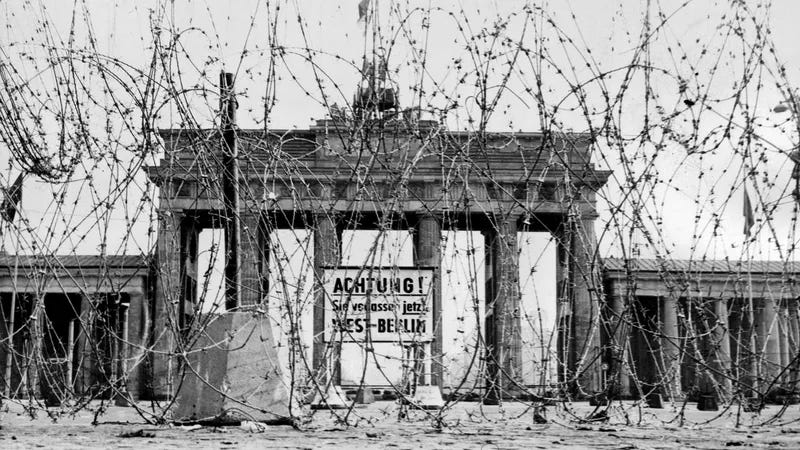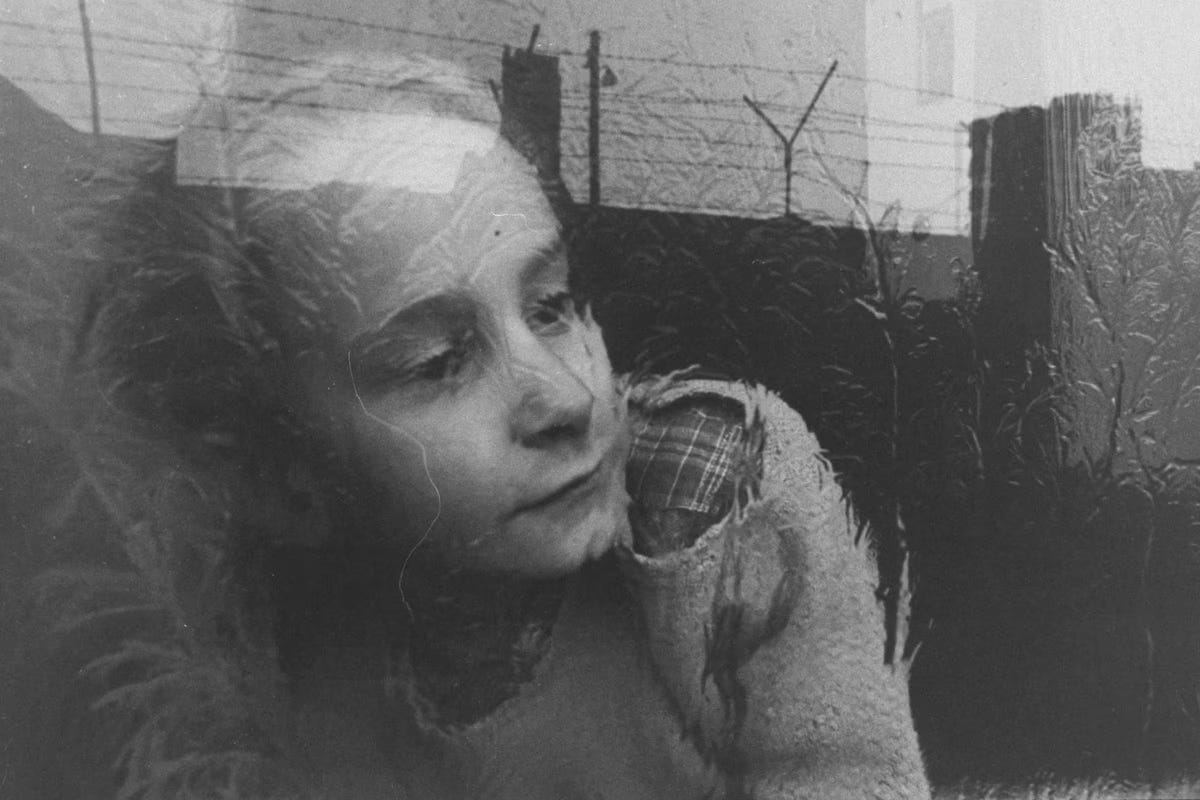Image credit: The Atlantic.
Well here we go, the first ‘real’ episode of The Transformed. If you missed the trailer, you can read it here.
If you enjoy reading these stories, please consider subscribing, liking, ‘restacking’ or, even better, sharing them with your friends.
So, let us begin.
It is 1978. Six years have elapsed since The Machine came online. It is fair to say that things have not gone well…
Defection
00000001
West Berlin, February 1978
The worst part about being wanted by the secret police in West Berlin is that nothing opens late anymore, if at all. Yvonne Kauffman stared through the grimy window of the apartment, watching the empty street below through streaks of rain that caught the sickly yellow glow of the single working streetlight. Two floors down, the shuttered café that should have been their salvation sat dark and abandoned, its windows still bearing the white tape crosses, marking where the Bundeskriminalamt had sealed it shut two days ago.
“Still nothing,” she whispered to the figure hunched by the radiator.
David Wright pulled his father's old Air Force flying jacket tighter around his shoulders. Even with the building's ancient heating system grinding away in the basement, the February cold seeped through every crack in the bullet-scarred walls. Above them, tiles still loose from the war rattled in the wind, a sound that had become as familiar as his own laboured breathing over their three days in this crumbling purgatory.
“Maybe Karl got picked up,” David said, not looking up from his hands. His voice carried the flat exhaustion of a man who'd used up his reserves of optimism. “Maybe the network is blown.”
Yvonne turned from the window, studying the young engineer who'd become her unlikely partner in this desperate gamble. He was twenty-six, barely out of MIT, the son of the legendary aircraft designer. Now here he was, hiding in a West Berlin safe house because he'd tried to share research on photocell efficiency improvements that The Machine had classified as “economically destabilising.”
“Karl will come,” she said, though her own certainty was wearing thin. “Der Wissensuntergrund doesn't abandon its people.”
Wright's laugh was bitter. “Tell that to the guys from Berkeley who tried to cross last month. The guards found them frozen in the death strip.”
The death strip. That's what they called the hundred-metre zone between the two walls now, not because East German guards shot people trying to escape, but because so many Western refugees died of exposure waiting for the crossing points to open. The Wall existed mainly to regulate the flow of Western intellectuals, scientists, and artists desperately trying to get out.
Yvonne returned to the window, watching the rain hammer against the cold glass forming rivulets that distorted the last few twinkling lights of West Berlin. Beyond the darkness, beyond the Wall, lay a world where her mathematical insights weren't branded as “destabilising influences on algorithmic stability.” Where the Soviet machine, built from vacuum tubes and desperation, had maintained an elegance that America's transistor-powered giant couldn't grasp.
“You know what the real joke is?” David said suddenly. “After the war, my father spent years driving research to beat the Soviets. Faster fighters, better bombers, turning efficiency into an industry of killing. He’d have a heart attack if he knew where I was headed.”
“Where we're headed,” Yvonne corrected gently. “And he might understand better than you think. Innovation always looks like rebellion to people in power.”
Wright stood and shuffled to the small table where their meagre supplies lay scattered: a half-empty bottle of Apfelschorle, some stale bread and the forged papers that Karl had provided during their first, and only, meeting. The documents were detailed, beautiful work, but they'd be useless if Der Wissensuntergrund had been compromised.
“No coffee, then?” Yvonne yawned half joking, half despondently, looking hopefully at the cold kettle by the rusty sink.
David sighed, “No. The electricity went out an hour after you fell asleep.”
Yvonne groaned, but David's expression revealed he had more pressing concerns.
“Three more hours until dawn,” David said, checking his watch. “If Karl doesn't show...”
“He'll show,” Yvonne said, but she could hear the doubt creeping into her own voice.
The silence stretched for minutes, filled only by the building's creaks and the distant hum of traffic on the Kurfürstendamm. Yvonne thought about her last conversation with Alan Kay, how his voice had turned careful and formal when she'd mentioned her interest in his “alternative computational frameworks.” Even he understood the danger now. Step too far outside its paradigms, and you found yourself branded as a security risk.
Wright suddenly stiffened, hissed. “Listen.”
Footsteps on the creaking stairs, slow, deliberate, trying to be quiet. They looked at each other, and she saw her own fear reflected in his eyes. If it was the BKA or the AIA's German liaisons, there would be nowhere to run.
Three soft knocks. A pause. Two more. Another pause. Then one final knock.
Yvonne's heart hammered as she recognised the pattern Karl had taught them. She moved to the door, her hand trembling slightly as she reached for the deadbolt.
“Wer ist da?” she whispered.
“Jemand, der die Wahrheit sucht,” came the response in accented German. Someone who seeks the truth.
She opened the door carefully, keeping the chain attached. Karl stood in the hallway, but he looked different, scared, more haggard than when they'd met him at the café three days ago. Behind him lurked a woman Yvonne didn't recognise, wearing a heavy coat and nervously checking the stairs.
“You came!” Yvonne exclaimed with relief.
He nodded grimly. “I'm sorry for the delay, Dr Kauffman. Things became... complicated. We go tonight.”
She slid back the chain and opened the door wider. Karl entered quickly, followed by the woman. In the apartment's dim light, Yvonne could see that Karl's left hand was bandaged.
“What happened to you?” Wright asked.
“Questions from people who don't like our work,” Karl said dismissively. “This is Ingrid. She'll help you cross. We leave in twenty minutes.”
“Twenty minutes?” Wright stood up abruptly. “But we thought...”
“Plans change,” Karl cut him off. “The café raid compromised more than we thought. Half our safe houses are blown, and the BKA is getting help from some very sophisticated surveillance systems. Your systems.”
Yvonne felt a chill that had nothing to do with the February cold, “The Agency?”
Karl nodded grimly. “They're using algorithmic pattern recognition to identify intellectual dissidents. Your research requests, your library records, your travel patterns, they feed it all in, and it tells them who's likely to defect.”
“Jesus,” Wright breathed. “They're using it to hunt free thinkers now.”
“Welcome to The Cage,” Ingrid said, speaking for the first time. Her English was perfect, but with an accent Yvonne couldn't place. “This is why we must get you out. The East needs people like you, people who can think beyond its boundaries.”
Yvonne grabbed her small bag, the one that contained her notebooks full of topological ideas that the authorities had dismissed as “mathematically subversive.” Wright was already putting on an ill-fitting trench coat over his father's jacket, but she could see the hesitation in his movements.
“David,” she said quietly. “You don't have to do this. You could go back, pretend this never happened. Your family reputation might protect you.”
Wright paused, one arm in his sleeve. For a moment, she thought he might actually take the offer. Then he straightened up and finished putting on the coat.
“My father used to say, ‘The machine that won’t fly is worthless, no matter how perfectly it’s built.’ Their Machine won’t… can’t… ever fly. It took my father’s work and reiterates on it, reworks it, attempts to optimise it but it will never…” He trailed off, knowing Yvonne had heard his argument a thousand times before.
Karl was at the window now, scanning the street. “Time to go. They'll have patrol patterns, but Ingrid knows a route through the sewers that predates their surveillance grid.”
“Sewers?” Wright looked queasy.
“Better than the camps,” Ingrid said matter-of-factly. “Which is where dissidents like you end up these days.”
They moved quickly then, gathering their few possessions and following Karl and Ingrid down the building's narrow stairs. The smell of boiled cabbage and cheap tobacco, overlaid with the musty dampness that seemed to permeate every structure in this part of the city.
At the building's rear entrance, Karl paused to check the alley. “Remember,” he whispered, “once we're in the tunnels, no talking unless absolutely necessary. Sound carries in ways you wouldn't expect.”
Yvonne nodded, her mouth too dry to speak. Perhaps ahead lay freedom, the chance to work with other mathematicians who weren't afraid of genuinely new ideas. But behind them lay everything they'd ever known, everyone they'd ever cared about.
Wright seemed to be thinking the same thing. “Will we ever be able to come back?”
Karl's smile was sad. “Dr. Wright, after tonight, there may not be an America worth you coming back to. Dissent is eliminated before it can even form. In five years, ten years, there may be no one left who remembers how to think original thoughts.”
“But there's still hope in the East?”
“In the East,” Ingrid said, “their machines are primitive enough that humans still have to do the real, creative thinking. It makes all the difference.”
Karl opened the door, and cold air rushed in, carrying the scent of rain and distant industrial smoke. “Come,” he said. “Tonight you escape. Tomorrow, you can begin building something better.”
They stepped out into the Berlin night, refugees from a future locked in place. Behind them, the flickering and dying lights of the West. Ahead, beyond the Wall and the death strip and the watchtowers, lay a world that was still capable of change.
As they made their way through the shadows toward the entrance to the storm drains, Yvonne found herself thinking about the ideas she carried in her notebooks, manifolds and transformations and the geometry of change itself. Soon, she hoped, she would be in a place where such ideas weren't considered threats to stability.
Soon, she would be in a place where the future was unwritten.
The sound of their footsteps echoed off the wet pavement as they disappeared into the underground passages that would carry them to freedom, or to whatever lay beyond the Knowledge Cage that had trapped half the world in 1972.
Forever.
© Bernard McCarty, 2025
Image credit: The Atlantic.



